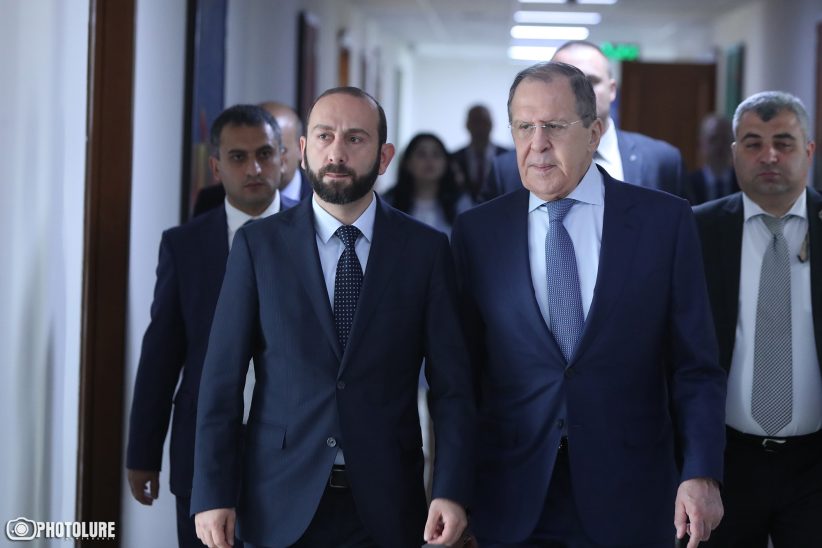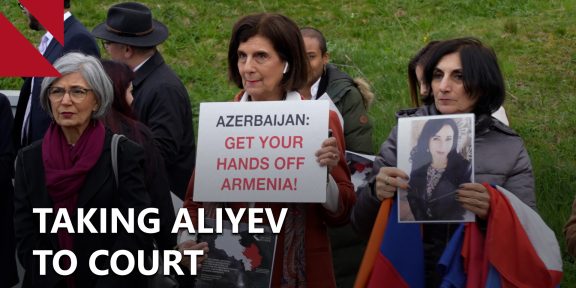By Mark Dovich
Armenia and Azerbaijan exchanged mutual accusations of violating the fragile ceasefire along the border over the weekend, days after the two countries’ leaders held “open and productive” talks in Brussels, and amid an apparent renewed diplomatic push by Russia in the region.
Armenia’s Defense Ministry said Azerbaijani troops opened fire Saturday “in the eastern part” of the border, while Azerbaijan’s Defense Ministry said Armenian soldiers fired “in the direction of” Kelbajar and Lachin on Saturday and Sunday.
Yerevan quickly dismissed Baku’s announcements as “disinformation.” Neither side reported any casualties.
At the same time, high-level Russian officials, including President Vladimir Putin, made a number of contacts with their counterparts in the South Caucasus region.
Armenian and Russian Foreign Ministers Ararat Mirzoyan and Sergey Lavrov spoke by phone last Thursday to review “progress in and prospects for implementing the trilateral agreements,” the Russian government said, followed by a meeting in Moscow Monday to discuss “issues concerning regional security and stability, as well as Armenian-Russian allied relations.”
The Russian government’s read-out of Mirzoyan and Lavrov’s call specified that the officials spoke “at the initiative of the Armenian side.”
Meanwhile, Russian President Vladimir Putin made separate phone calls to his Azerbaijani and Turkish counterparts.
Putin and Azerbaijani President Ilham Aliyev “discussed in detail the current situation in the South Caucasus” and stressed the importance of “consistently implementing the fundamental trilateral agreements,” the Kremlin said.
The same day, Putin and Turkish President Recep Tayyip Erdoğan discussed “issues of further developing multifaceted cooperation between Russia and Turkey,” as well as “the situation in Ukraine.”
Putin spoke with Armenian Prime Minister Nikol Pashinyan by phone four times last month, but has not been in direct contact with Pashinyan since last week’s Brussels summit.
After those negotiations, Pashinyan and Aliyev agreed to another round of talks in Brussels “by the end of November.” They also decided to set up meetings between their deputy prime ministers “in November” and between their foreign ministers “within one month.”
Also read: Armenia, Azerbaijan agree to more meetings after ‘productive’ Brussels talks
The European Union has sought a greater mediating role between Armenia and Azerbaijan in recent months, amid apparent paralysis at the Minsk Group, a body that has led efforts to mediate a peaceful resolution for many years, largely without result. Washington has welcomed Brussels’ involvement, while Moscow has said it amounts to interference.
Hours before the summit began, Maria Zakharova, a spokesperson for Russia’s Foreign Ministry, accused the EU of “attempting to shamelessly appropriate the laurels of mediation” from Russia on the Karabakh issue.
At a cabinet meeting the day after, Pashinyan conceded that Armenia’s ongoing normalization efforts with Azerbaijan are “not easy, not clear, and the possible solutions are not obvious” while also stressing that his government remains committed to “the peace agenda.”
Mirzoyan also commented publicly on the Brussels talks, saying over the weekend that largely fruitless negotiations “gives the Armenian side reason to question the sincerity of Azerbaijan’s intention to achieve peace.”
“Continued arbitrary and false interpretations of the negotiations and avoiding implementing the agreements give the impression that Azerbaijan intends to undermine the peace process and continue its policy of ethnic cleansing through the use of force,” he added.
In a separate development, Armenian Defense Minister Suren Papikyan left for Washington Monday, according to the Armenian Defense Ministry, which has not specified who Papikyan is set to meet.
















